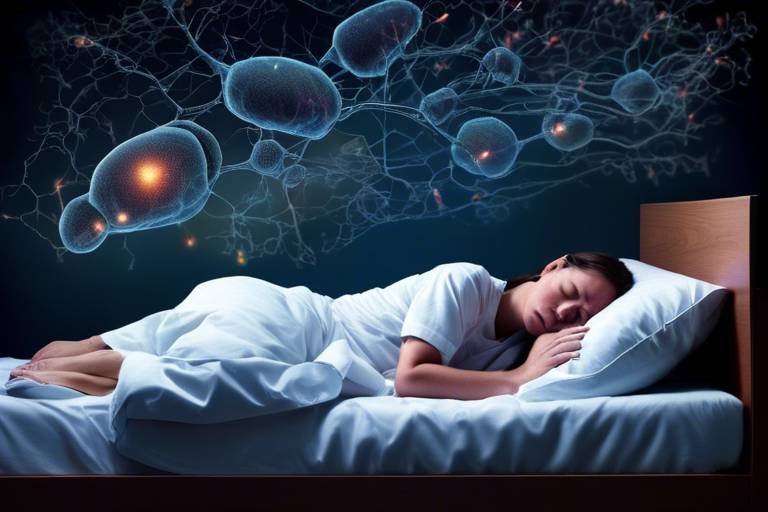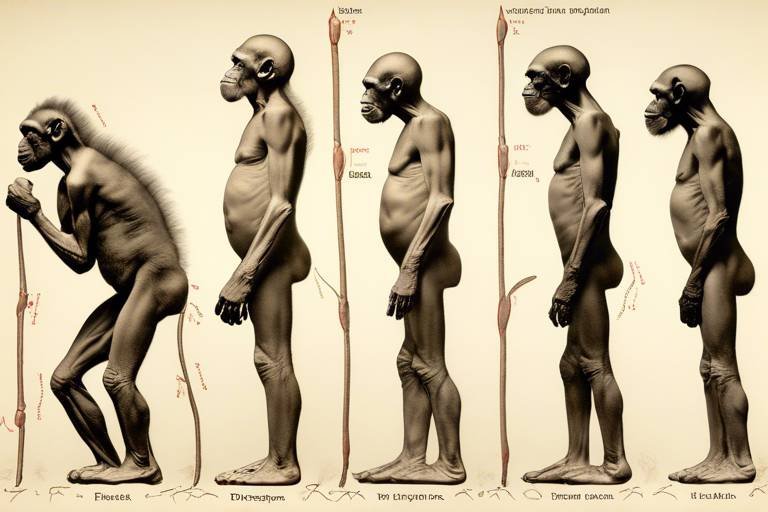The Biology of Sleep - Why We Need It
Sleep is not just a time for our bodies to rest; it’s a complex biological process essential for our overall health and well-being. Imagine sleep as a nightly tune-up for your body and mind, where every hour spent in slumber is a step towards rejuvenation. During these hours, our bodies undergo various processes that are crucial for physical recovery, cognitive function, and emotional stability. So, why do we need sleep? The answer lies in the intricate dance of hormones, neurotransmitters, and biological rhythms that work together to keep us functioning at our best.
One of the most fascinating aspects of sleep is its cyclical nature. Our sleep is divided into stages, primarily categorized into REM (Rapid Eye Movement) and non-REM sleep. Each stage serves a unique purpose. For instance, during non-REM sleep, our body focuses on physical restoration, repairing tissues, and building bone and muscle. Meanwhile, REM sleep is where the magic happens for our brains—this is when we dream, and our brains process information, consolidate memories, and even enhance our creativity. It's like a nightly workshop for our minds, where ideas are refined and stored for future use.
But what happens when we don’t get enough sleep? The consequences can be dire. Chronic sleep deprivation can lead to a myriad of health issues, from obesity and diabetes to mental health disorders like anxiety and depression. When we skimp on sleep, we’re not just sacrificing our energy levels; we’re putting our overall health at risk. It’s like trying to drive a car without fuel—eventually, it’s going to stall. Therefore, understanding the biology of sleep and its critical functions is essential for maintaining not just our health, but our quality of life.
In a world that often glorifies hustle and productivity, it’s easy to overlook the importance of a good night’s sleep. Yet, prioritizing sleep is one of the most beneficial choices we can make. By recognizing the biological mechanisms behind sleep, we can better appreciate its value and make informed choices to enhance our sleep quality. So, let’s dive deeper into the stages of sleep, the role of circadian rhythms, and the health consequences of sleep deprivation.
Understanding the different stages of sleep, including REM and non-REM cycles, is crucial for recognizing how they contribute to overall health and cognitive function.
Circadian rhythms regulate our sleep-wake cycles, influenced by environmental cues. This section discusses how these natural processes impact our daily lives and overall health.
Exposure to natural and artificial light significantly affects melatonin production and sleep quality. This subheading delves into the relationship between light and our sleep patterns.
Blue light emitted from screens can disrupt sleep by interfering with melatonin levels. This section examines strategies to mitigate its effects for better sleep hygiene.
Seasonal variations can alter our circadian rhythms and sleep quality. Here, we explore how different seasons impact sleep patterns and overall well-being.
Sleep plays a vital role in cognitive processes such as memory consolidation and learning. This subheading highlights the importance of sleep for optimal brain function.
Chronic sleep deprivation can lead to various health issues, including obesity, diabetes, and mental health disorders. This section discusses the serious implications of insufficient sleep.
Lack of sleep is linked to numerous physical health problems. This subheading examines how sleep deprivation negatively impacts cardiovascular health and immune function.
Sleep deprivation can exacerbate mental health conditions such as anxiety and depression. Here, we discuss the intricate relationship between sleep and mental well-being.
Implementing effective strategies can significantly enhance sleep quality. This section provides practical tips for establishing healthy sleep habits and routines for better rest.
- How many hours of sleep do adults need? Most adults need between 7-9 hours of sleep per night for optimal health.
- What are the best practices for improving sleep quality? Establishing a consistent sleep schedule, creating a restful environment, and limiting screen time before bed can enhance sleep quality.
- Can napping be beneficial? Short naps can be beneficial for improving alertness and performance, but long naps may interfere with nighttime sleep.
- What are the signs of sleep deprivation? Common signs include excessive daytime sleepiness, irritability, difficulty concentrating, and frequent yawning.

The Stages of Sleep
Understanding the different stages of sleep is like peeling back the layers of an onion; each layer reveals something essential about our health and well-being. Sleep is not just a passive state of rest; it consists of several stages that play unique and critical roles in rejuvenating our bodies and minds. Generally, sleep can be divided into two main categories: Non-REM (NREM) and REM (Rapid Eye Movement) sleep. Each of these stages has distinct characteristics and functions that are vital for our overall health.
Non-REM sleep is further divided into three stages: N1, N2, and N3. During N1, the transition from wakefulness to sleep occurs, and you might experience sensations like falling or muscle jerks. This stage is relatively short, lasting only a few minutes. As you progress to N2, your heart rate slows, and your body temperature drops—this stage accounts for about 50% of total sleep time. Finally, N3, also known as deep sleep or slow-wave sleep, is crucial for physical restoration. During this stage, the body repairs tissues, builds bone and muscle, and strengthens the immune system.
On the other hand, REM sleep is where the magic happens. This stage is characterized by rapid eye movements, increased brain activity, and vivid dreams. Although REM sleep only accounts for about 20-25% of total sleep time, it plays a critical role in cognitive functions such as memory consolidation and emotional processing. Think of REM sleep as the brain's "housekeeping" time, where it organizes and stores information gathered throughout the day. The cycles of sleep stages repeat multiple times throughout the night, typically lasting about 90 minutes each, allowing your body to alternate between restorative deep sleep and dream-filled REM sleep.
To better understand these stages, here’s a simplified table that outlines the key features:
| Stage | Characteristics | Duration |
|---|---|---|
| N1 | Light sleep, transition from wakefulness | 5-10 minutes |
| N2 | Moderate sleep, heart rate slows | 20-25 minutes |
| N3 | Deep sleep, physical restoration | 20-40 minutes |
| REM | Vivid dreams, brain activity increases | 10-20 minutes |
Recognizing these stages is essential for understanding how sleep contributes to our health. Each stage serves a specific purpose, and disruptions in any of these stages can lead to a cascade of negative effects on our physical and mental well-being. Have you ever woken up feeling groggy? That might be a sign that you were jolted awake during a deep sleep stage. The next time you tuck yourself in for the night, consider the incredible processes happening within you. Sleep is not just a time to recharge; it's a complex biological dance that keeps us functioning at our best.
- How many hours of sleep do I need? Most adults require 7-9 hours of sleep per night for optimal health.
- What can disrupt my sleep stages? Factors like stress, caffeine, and electronics can interfere with your sleep cycles.
- Can I improve my REM sleep? Yes, establishing a regular sleep schedule and creating a calming bedtime routine can enhance REM sleep.

The Role of Circadian Rhythms
Have you ever noticed how your energy levels fluctuate throughout the day? That’s no coincidence! Our bodies are governed by circadian rhythms, which are essentially internal clocks that regulate our sleep-wake cycles over a 24-hour period. These rhythms are influenced by various environmental cues, predominantly light and darkness. Imagine your body as a finely tuned orchestra, where each instrument plays a vital role in creating a harmonious symphony of health and well-being. When everything is in sync, you feel energized, focused, and ready to take on the world. But when those rhythms are disrupted, the music can quickly turn into a cacophony of fatigue and irritability.
Circadian rhythms are not just about sleep; they also influence other critical functions such as hormone release, eating habits, and even body temperature. For instance, your body produces melatonin, the sleep hormone, in response to darkness, signaling it’s time to wind down. Conversely, exposure to bright light, especially in the morning, helps to reset this clock, making you feel alert and awake. It's like having a personal assistant that reminds you when to sleep and when to rise, but it requires the right cues to function effectively.
Interestingly, these rhythms can vary from person to person. Some people are natural night owls, while others are early birds. This variation is largely influenced by genetics, but lifestyle choices and environmental factors also play significant roles. For example, if you consistently go to bed late and wake up late, your body may adapt to this schedule, but it doesn’t mean it’s the healthiest option. In fact, misaligning your circadian rhythm can lead to a host of problems, including poor sleep quality, decreased cognitive function, and even long-term health issues.
One fascinating aspect of circadian rhythms is their adaptability. They can shift due to changes in your environment, like traveling across time zones or working night shifts. However, frequent disruptions can lead to what’s known as social jetlag, where your internal clock is out of sync with your social obligations. This can leave you feeling groggy and unfocused, much like the feeling of waking up in a different time zone without adjusting to the new schedule. To combat this, it's essential to establish a consistent sleep routine that aligns with your natural rhythms.
So, how can you support your circadian rhythms for better sleep and overall health? Here are some practical tips:
- Maintain a consistent sleep schedule by going to bed and waking up at the same time each day.
- Limit exposure to artificial light, especially blue light from screens, in the evening.
- Get plenty of natural light during the day, particularly in the morning.
- Create a calming bedtime routine to signal your body that it’s time to wind down.
Understanding and respecting your circadian rhythms can significantly enhance your quality of life. By aligning your daily activities with your natural biological clock, you not only improve your sleep but also boost your mood, productivity, and overall health. Remember, your body is a remarkable system that thrives on routine, so give it the rhythm it needs to dance through life!
- What are circadian rhythms? They are natural, internal processes that follow a roughly 24-hour cycle, influencing sleep, hormone release, and other bodily functions.
- How do light and darkness affect circadian rhythms? Light exposure helps regulate the production of melatonin, while darkness promotes its release, signaling when to sleep.
- Can I reset my circadian rhythm? Yes, establishing a consistent sleep schedule and getting ample natural light during the day can help realign your internal clock.

Light and Sleep
Have you ever noticed how a bright, sunny day can lift your mood while a dim, overcast afternoon can make you feel sluggish? Well, it turns out that the light we’re exposed to plays a crucial role in regulating our sleep patterns. Our bodies are wired to respond to light and darkness, which significantly impacts our sleep quality. This relationship is primarily governed by a hormone called melatonin, often referred to as the "sleep hormone." When the sun sets and darkness envelops the environment, our bodies naturally increase melatonin production, signaling that it’s time to wind down and prepare for sleep.
However, the modern world presents a unique challenge. With the advent of artificial lighting and screens, many of us are exposed to light well into the night. This can confuse our biological clock, leading to difficulties in falling asleep and staying asleep. The impact of light on sleep can be broken down into a few key areas:
- Natural Light: Exposure to natural sunlight during the day helps regulate our circadian rhythms, promoting alertness and a healthy sleep-wake cycle. It’s like charging your internal battery!
- Artificial Light: The blue light emitted from devices such as smartphones, tablets, and computers can suppress melatonin production. This interference can trick your brain into thinking it’s still daytime, making it harder to fall asleep at night.
- Light Therapy: For those who struggle with sleep due to seasonal changes or irregular schedules, light therapy can be a game-changer. This involves using bright light boxes to mimic natural sunlight, helping to reset your circadian rhythms.
Interestingly, the timing of light exposure is just as important as the intensity. Morning light can help you feel more awake and alert, while minimizing light exposure in the evening can enhance your ability to fall asleep. Think of it as setting the stage for a performance; the right lighting can create the perfect ambiance for relaxation and rest.
To better understand how light affects sleep, let’s take a look at a simple table comparing the effects of different types of light:
| Type of Light | Effect on Sleep |
|---|---|
| Natural Light | Boosts mood, regulates circadian rhythms, enhances sleep quality. |
| Artificial Light (General) | Can disrupt sleep patterns, especially if used close to bedtime. |
| Blue Light | Significantly suppresses melatonin, making it harder to fall asleep. |
| Light Therapy | Can help reset circadian rhythms and improve sleep quality. |
In conclusion, understanding the intricate relationship between light and sleep is vital for anyone looking to improve their sleep quality. By managing light exposure throughout the day and evening, you can create a more conducive environment for restful sleep. So, next time you find yourself scrolling on your phone before bed, remember that you might be sabotaging your sleep without even realizing it!
- How does blue light affect my sleep? Blue light can interfere with melatonin production, making it harder to fall asleep.
- What can I do to reduce blue light exposure? Consider using blue light filters on your devices or wearing special glasses that block blue light.
- Is natural light beneficial for sleep? Yes, exposure to natural light during the day helps regulate your circadian rhythms and improves sleep quality.

Blue Light Impact
In today’s digital age, we are constantly surrounded by screens—whether it’s our smartphones, tablets, or computers. This exposure to blue light has become a hot topic, especially when it comes to our sleep quality. But what exactly is blue light, and why should we care? Blue light is a high-energy visible light that is emitted by electronic devices and LED lighting. It has been shown to have a significant impact on our circadian rhythms, which are the natural processes that regulate our sleep-wake cycles.
When we are exposed to blue light, particularly in the evening, it can interfere with the production of melatonin, the hormone responsible for signaling our body that it’s time to sleep. Think of melatonin as your body’s natural sleep aid; when its levels drop, it becomes harder for us to drift off into a restful slumber. Studies have shown that using devices that emit blue light just before bedtime can lead to increased alertness and delayed sleep onset. Imagine trying to fall asleep while listening to your favorite upbeat song—it's challenging, right? That’s what blue light does to our brains.
Moreover, the effects of blue light aren't just limited to sleep disruption. Prolonged exposure can lead to digital eye strain, which can cause discomfort and fatigue. Symptoms can include headaches, blurred vision, and dry eyes. If you find yourself squinting at your screen or feeling the need to rub your eyes, you might be experiencing the fallout from too much blue light. Here's a quick look at some of the common symptoms of digital eye strain:
| Symptoms | Description |
|---|---|
| Headaches | Pain or discomfort in the head, often caused by prolonged screen time. |
| Blurred Vision | Difficulty focusing on objects, especially after long periods of screen use. |
| Dry Eyes | Feeling of dryness or irritation in the eyes due to reduced blinking. |
So, what can we do to mitigate the impact of blue light on our sleep? Here are a few strategies:
- Limit Screen Time: Try to reduce your use of electronic devices at least an hour before bed.
- Use Blue Light Filters: Many devices now come with settings that reduce blue light emissions.
- Wear Blue Light Blocking Glasses: These glasses can help filter out blue light, especially if you must use screens in the evening.
Incorporating these strategies into your routine can significantly improve your sleep quality and overall well-being. Remember, our bodies are not designed to be exposed to artificial light at night, and by taking proactive steps, we can nurture our natural sleep cycles and enjoy more restful nights.

Seasonal Changes
Have you ever noticed how your sleep patterns seem to shift with the seasons? It's not just in your head; there’s a biological basis for this phenomenon. As the seasons change, so do our circadian rhythms, which can significantly impact the quality and duration of our sleep. During the longer days of summer, many people find it easier to stay awake later into the evening, while the shorter days of winter can lead to a desire to hibernate. This seasonal fluctuation is largely due to the varying amounts of natural light we’re exposed to throughout the year.
In winter, when daylight is scarce, our bodies may produce more melatonin, the hormone that regulates sleep, leading to increased sleepiness and longer sleep durations. Conversely, in the summer, the abundance of sunlight can suppress melatonin production, causing us to feel more alert and awake. This can sometimes result in a mismatch between our internal clocks and our external environment, leading to difficulties in falling asleep or waking up at the desired times.
Moreover, seasonal changes can also affect our mood and energy levels, which in turn influences our sleep. For instance, many individuals experience symptoms of Seasonal Affective Disorder (SAD) during the winter months, characterized by feelings of sadness, fatigue, and changes in sleep patterns. This condition highlights the intricate connection between our mental health and our sleep quality. In fact, studies have shown that people with SAD often report insomnia or hypersomnia, which can exacerbate their overall feelings of lethargy and sadness.
To illustrate how seasonal changes can affect sleep, consider the following table that summarizes the typical sleep patterns in different seasons:
| Season | Typical Sleep Duration | Common Sleep Issues |
|---|---|---|
| Spring | 7-8 hours | Allergies may disrupt sleep |
| Summer | 6-7 hours | Difficulty falling asleep due to longer daylight |
| Fall | 7-8 hours | Adjustment to earlier darkness |
| Winter | 8-9 hours | Increased sleepiness and potential SAD symptoms |
So, what can you do to adapt to these seasonal changes? One effective strategy is to adjust your exposure to light. In winter, consider using a light therapy box to simulate sunlight and help regulate your circadian rhythms. In summer, try to limit exposure to bright screens before bedtime to help your body naturally wind down. By being aware of how the seasons impact your sleep, you can take proactive steps to ensure you get the restful sleep you need, no matter the time of year.
- How can I improve my sleep during the winter months?
Consider using a light therapy box and maintaining a consistent sleep schedule to combat increased sleepiness. - What are the signs of Seasonal Affective Disorder?
Symptoms may include persistent sadness, fatigue, changes in sleep patterns, and difficulty concentrating. - Is it normal to sleep more in winter?
Yes, many people experience longer sleep durations during the winter due to increased melatonin production. - How does exposure to light affect sleep?
Natural light exposure helps regulate melatonin production, which is crucial for maintaining healthy sleep cycles.

Sleep and Brain Function
When you think about sleep, you might picture a cozy bed and a peaceful night. But did you know that sleep is like a superhero for your brain? It’s not just about resting; it’s about recharging your mental batteries! During sleep, your brain goes through a series of complex processes that are crucial for memory consolidation, learning, and overall cognitive function. Imagine your brain as a busy office; during the day, it’s filled with tasks and information, but at night, it organizes everything, clearing out the clutter and making room for new ideas.
One of the most fascinating aspects of sleep is the role it plays in memory consolidation. This process occurs primarily during the REM (Rapid Eye Movement) stage of sleep, where the brain actively processes and stores information from the day. Studies have shown that getting a good night’s sleep after learning something new can significantly enhance your ability to recall that information later. It's like hitting the "save" button on your brain's hard drive! Without adequate sleep, you risk losing those precious memories, much like forgetting where you put your keys.
Moreover, sleep is essential for problem-solving and creativity. Have you ever woken up with a brilliant idea or a solution to a tricky problem? That’s no coincidence! During sleep, your brain makes connections between different pieces of information, often leading to sudden insights or "aha!" moments. In fact, many famous inventors and artists have credited their breakthroughs to dreams or moments of clarity that came after a good night's rest. So, if you’re struggling with a creative block, consider catching some Z’s instead of staring at a blank page!
It’s not just about memory and creativity; sleep also plays a vital role in maintaining your emotional balance. A well-rested brain is better equipped to handle stress and regulate emotions. When you’re sleep-deprived, you might find yourself feeling irritable or overwhelmed by everyday challenges. Think of your brain as a computer; when it’s overloaded and not functioning properly, it can’t process information effectively. Ensuring you get enough sleep helps keep your emotional responses in check, allowing you to face life’s ups and downs with a clearer mind.
To illustrate the impact of sleep on brain function, consider the following table:
| Aspect of Brain Function | Impact of Adequate Sleep | Impact of Sleep Deprivation |
|---|---|---|
| Memory Consolidation | Enhances recall and learning | Leads to forgetfulness and impaired learning |
| Problem Solving | Boosts creativity and insight | Inhibits innovative thinking |
| Emotional Regulation | Improves mood stability | Increases irritability and stress |
In conclusion, the relationship between sleep and brain function is profound and multifaceted. Prioritizing quality sleep is not just about feeling rested; it’s about enhancing your cognitive abilities, emotional well-being, and overall quality of life. So, the next time you consider sacrificing sleep for more work or entertainment, remember that your brain is counting on you to give it the rest it deserves!
- How much sleep do adults need? Most adults require between 7 to 9 hours of sleep per night for optimal health.
- Can naps improve brain function? Yes, short naps can enhance alertness and improve cognitive performance.
- What are some tips for better sleep? Establish a regular sleep schedule, create a comfortable sleep environment, and limit screen time before bed.

Health Consequences of Sleep Deprivation
Sleep deprivation is not just a minor inconvenience; it's a serious issue that can wreak havoc on your health. When we skimp on sleep, we’re not just robbing ourselves of rest—we're also inviting a host of health problems that can affect both our bodies and minds. Think of sleep as the body's nightly maintenance session, where everything from cell repair to memory consolidation takes place. When this process is interrupted, the consequences can be dire.
First and foremost, chronic sleep deprivation is closely linked to a range of physical health issues. Research has shown that lack of sleep can lead to weight gain and obesity. When we don't get enough sleep, our bodies produce more of the hormone ghrelin, which stimulates appetite, and less leptin, which signals fullness. This hormonal imbalance can make it all too easy to reach for that extra slice of pizza or indulge in late-night snacking.
Moreover, insufficient sleep has been linked to serious conditions such as:
- Cardiovascular Disease: Sleep plays a crucial role in heart health. Sleep deprivation can increase blood pressure and inflammation, leading to a higher risk of heart disease.
- Diabetes: Lack of sleep can disrupt the body's ability to use insulin effectively, increasing the risk of type 2 diabetes.
- Weakened Immune System: Sleep is essential for a robust immune response. Chronic sleep deprivation can impair the immune system, making you more susceptible to infections.
But the effects of sleep deprivation don't stop at physical health. Our mental health takes a hit as well. Studies have shown that people who don't get enough sleep are more prone to mood disorders. Anxiety and depression can become exacerbated, creating a vicious cycle where poor sleep contributes to mental health issues, which in turn makes it even harder to get a good night's rest. It's like trying to climb a mountain with no gear—each step feels heavier than the last.
Additionally, cognitive functions suffer dramatically when we don't prioritize sleep. Memory consolidation, problem-solving skills, and decision-making abilities all decline. Imagine trying to solve a puzzle with missing pieces; that's what your brain feels like when it's sleep-deprived. You might find yourself forgetting important tasks, struggling to focus, or feeling mentally foggy throughout the day. This cognitive decline can have serious implications for work performance and overall quality of life.
In summary, the health consequences of sleep deprivation are far-reaching and can affect nearly every aspect of our well-being. From physical health risks like obesity and heart disease to mental health struggles and cognitive decline, the stakes are high. It's essential to prioritize sleep and establish healthy sleep habits to safeguard our health. After all, a good night's sleep is not just a luxury—it's a necessity.
1. How much sleep do adults need? Most adults require between 7 to 9 hours of sleep per night for optimal health.
2. Can short naps help reduce the effects of sleep deprivation? Yes, short naps can provide a temporary boost in alertness and performance, but they shouldn't replace a full night's sleep.
3. What are some signs of sleep deprivation? Common signs include fatigue, irritability, difficulty concentrating, and increased appetite.
4. How can I improve my sleep quality? Establishing a regular sleep schedule, creating a comfortable sleep environment, and limiting screen time before bed can all help improve sleep quality.

Physical Health Risks
When we talk about sleep, we often focus on how it makes us feel the next day—whether we’re groggy or bright-eyed and bushy-tailed. However, the implications of chronic sleep deprivation stretch far deeper than just a rough morning. Imagine your body as a finely tuned machine; when one part of it doesn’t function properly, the whole system can start to break down. Lack of sleep is like running that machine without oil—it may still work for a while, but eventually, it will overheat and malfunction.
Research has shown that insufficient sleep can lead to a variety of serious physical health risks. These include:
- Obesity: Sleep deprivation disrupts the hormones that regulate appetite, leading to increased hunger and cravings for unhealthy foods.
- Cardiovascular Issues: Poor sleep can increase the risk of heart disease and hypertension, as the body struggles to regulate stress and inflammation effectively.
- Diabetes: Lack of sleep can affect insulin sensitivity, making it harder for the body to manage blood sugar levels.
- Weakened Immune System: Sleep is crucial for the immune system to function optimally. Without adequate rest, your body becomes less effective at fighting off infections.
These risks aren’t just theoretical; they’re backed by numerous studies. For instance, a study published in the journal Sleep found that individuals who sleep less than six hours a night are at a significantly higher risk of developing obesity compared to those who get the recommended seven to nine hours. It’s as if your body is putting up a “Help Wanted” sign for health issues when you skimp on sleep.
Furthermore, let’s not overlook the impact of sleep on your cardiovascular health. When you're sleep-deprived, your body produces more stress hormones like cortisol, which can lead to increased heart rate and blood pressure. Over time, this can contribute to serious conditions such as heart attacks and strokes. Think of it as driving your car with the gas pedal pressed down continuously; eventually, something is going to give.
To illustrate the connections between sleep deprivation and these health risks, consider the following table:
| Health Risk | Impact of Sleep Deprivation |
|---|---|
| Obesity | Increased appetite and cravings for high-calorie foods |
| Cardiovascular Issues | Higher blood pressure and increased heart rate |
| Diabetes | Reduced insulin sensitivity and poor blood sugar control |
| Weakened Immune System | Increased susceptibility to infections and illnesses |
In conclusion, the physical health risks associated with sleep deprivation are not to be taken lightly. Sleep is not just a luxury; it’s a biological necessity. By prioritizing our sleep, we’re not only enhancing our daily performance but also safeguarding our long-term health. So, the next time you think about sacrificing sleep for that extra hour of Netflix or late-night work, remember: your body is pleading for rest, and ignoring it could lead to serious consequences.
Q: How many hours of sleep do I need each night?
A: Most adults need between 7 to 9 hours of sleep per night for optimal health.
Q: What are the signs of sleep deprivation?
A: Common signs include persistent fatigue, difficulty concentrating, irritability, and increased appetite.
Q: Can napping help with sleep deprivation?
A: Short naps can provide a temporary boost in alertness, but they shouldn’t replace a full night’s sleep.
Q: How can I improve my sleep quality?
A: Establishing a regular sleep schedule, creating a comfortable sleep environment, and limiting screen time before bed can help improve sleep quality.

Mental Health Effects
Sleep deprivation doesn't just leave you yawning at your desk; it can seriously mess with your mental health. Imagine trying to drive a car with a foggy windshield—it's not just frustrating; it's dangerous. That's what lack of sleep does to your brain. When you skimp on sleep, you're not just losing precious hours; you're also depriving your mind of the rest it desperately needs to function properly. Studies have shown that insufficient sleep can exacerbate conditions like anxiety and depression, creating a vicious cycle that can be hard to break.
When you're sleep-deprived, your brain struggles to regulate emotions. This can lead to increased irritability, mood swings, and even feelings of hopelessness. You might find yourself overreacting to minor annoyances or feeling overwhelmed by daily tasks. In fact, research indicates that individuals with chronic sleep issues are at a higher risk of developing mood disorders. It's as if your brain is in a constant state of alarm, unable to calm down and process thoughts and feelings effectively.
To illustrate the connection between sleep and mental health, consider the following table:
| Mental Health Condition | Impact of Sleep Deprivation |
|---|---|
| Anxiety | Increased anxiety levels, difficulty managing stress |
| Depression | Worsening symptoms, decreased motivation |
| ADHD | Increased impulsivity and difficulty focusing |
| Bipolar Disorder | Heightened mood swings and manic episodes |
Furthermore, sleep plays a crucial role in memory consolidation. When you sleep, your brain is busy sorting through the day's experiences, organizing memories, and even making connections between new information and what you already know. Without adequate sleep, this process is disrupted, leading to difficulties in learning and retaining information. Think of your brain as a filing cabinet; without enough sleep, the cabinet becomes cluttered and disorganized, making it hard to find what you need.
So, what can you do to break this cycle? It's essential to prioritize sleep as a fundamental aspect of mental health. Establishing a consistent sleep schedule, creating a relaxing bedtime routine, and ensuring your sleep environment is conducive to rest can all contribute to better sleep quality. Remember, taking care of your mind starts with taking care of your body. By giving yourself the sleep you need, you're not just improving your mood; you're investing in your overall mental well-being.
- How much sleep do adults need? Most adults require between 7 to 9 hours of sleep per night for optimal health.
- Can sleep deprivation cause anxiety? Yes, lack of sleep can increase anxiety levels and exacerbate existing mental health conditions.
- What are some tips for improving sleep quality? Establish a consistent sleep schedule, create a relaxing bedtime routine, and limit exposure to screens before bed.
- Is napping beneficial? Short naps can be beneficial, but long or frequent napping can interfere with nighttime sleep.

Improving Sleep Quality
In today's fast-paced world, improving sleep quality has become a necessity rather than a luxury. Many of us often find ourselves tossing and turning at night, wondering why we can't drift off into a peaceful slumber. The good news is that there are several effective strategies we can implement to enhance our sleep experience. Think of it as creating your own personal sleep sanctuary—where comfort, routine, and environment come together to ensure a restful night. Here are some key approaches to consider:
First and foremost, establishing a consistent sleep schedule is crucial. Going to bed and waking up at the same time every day helps regulate your body's internal clock. This means that even on weekends, try to stick to your routine. It’s like training for a marathon; your body gets used to the rhythm, and before you know it, you’ll feel sleepy at the right time. Additionally, creating a relaxing bedtime routine can signal your body that it’s time to wind down. Activities such as reading a book, taking a warm bath, or practicing meditation can significantly improve your ability to fall asleep quickly.
Next, let’s talk about your sleep environment. A dark, cool, and quiet room is ideal for promoting quality sleep. Consider investing in blackout curtains to block out any unwanted light, and keep your bedroom temperature at a comfortable level—around 60 to 67 degrees Fahrenheit is often recommended. You might also want to explore the benefits of white noise machines or earplugs if you live in a noisy area. Think of your bedroom as a cocoon, where every element is designed to cradle you into a deep, restorative sleep.
Moreover, it's essential to be mindful of what you consume before bed. Caffeine and nicotine are stimulants that can keep you alert when you should be winding down. Try to limit these substances in the hours leading up to your bedtime. Alcohol might seem like a good way to relax, but it can disrupt your sleep cycle and lead to poorer sleep quality. Instead, consider herbal teas or warm milk as soothing alternatives that promote relaxation. Your body is like a finely-tuned machine; feed it the right fuel, and it will reward you with better sleep.
Lastly, let’s not forget about the impact of technology on our sleep. With screens everywhere—phones, tablets, TVs—it's easy to get caught up in late-night scrolling. However, the blue light emitted from these devices can interfere with melatonin production, making it harder for you to fall asleep. A good rule of thumb is to put down your devices at least an hour before bed. If you must use them, consider using blue light filters or apps designed to reduce blue light exposure. Imagine your brain as a dimmer switch; it needs time to adjust to the darkness before it can fully relax.
In summary, improving sleep quality is about creating a holistic approach that encompasses routine, environment, diet, and technology use. By making small, intentional changes, you can turn your sleep from a restless challenge into a rejuvenating experience. Remember, quality sleep is not just a dream—it's a vital part of your overall health and well-being.
- How many hours of sleep do adults need? Most adults require between 7 to 9 hours of sleep per night for optimal health.
- Can napping during the day affect my nighttime sleep? Yes, long or irregular napping can negatively impact your nighttime sleep quality.
- What is the best position for sleeping? The best sleeping position varies from person to person, but sleeping on your back is often considered the healthiest option.
- How can I tell if I have a sleep disorder? If you consistently struggle to fall asleep, stay asleep, or feel excessively tired during the day, it may be time to consult a healthcare professional.
Frequently Asked Questions
- What are the different stages of sleep?
Sleep is divided into two main types: REM (Rapid Eye Movement) and non-REM sleep. Non-REM sleep consists of three stages, ranging from light sleep to deep sleep. Each stage plays a crucial role in physical restoration, memory consolidation, and overall health.
- How do circadian rhythms affect sleep?
Circadian rhythms are our body's internal clock, regulating the sleep-wake cycle over a 24-hour period. They are influenced by external factors like light and darkness, helping to determine when we feel awake or sleepy. Disruptions to these rhythms can lead to poor sleep quality and health issues.
- What is the impact of blue light on sleep?
Blue light, primarily emitted by screens, can interfere with melatonin production, the hormone responsible for regulating sleep. Exposure to blue light in the evening can trick your brain into thinking it's still daytime, making it harder to fall asleep. Limiting screen time before bed can help improve sleep quality.
- How does sleep deprivation affect mental health?
Lack of sleep can exacerbate mental health issues such as anxiety and depression. When we don't get enough sleep, our ability to manage stress diminishes, leading to heightened emotional responses and cognitive difficulties. Prioritizing sleep is essential for maintaining mental well-being.
- What are some tips for improving sleep quality?
To enhance sleep quality, consider establishing a consistent sleep schedule, creating a relaxing bedtime routine, and optimizing your sleep environment. Keeping your bedroom dark, cool, and quiet can also promote better sleep. Additionally, reducing caffeine and heavy meals before bedtime can make a significant difference.
- Can seasonal changes affect sleep patterns?
Yes, seasonal changes can impact our circadian rhythms and sleep quality. For instance, longer daylight hours in summer can lead to later bedtimes, while shorter days in winter might encourage earlier sleep. Being mindful of these changes and adjusting your habits accordingly can help maintain a healthy sleep schedule.
- What are the physical health risks associated with sleep deprivation?
Chronic sleep deprivation is linked to various physical health issues, including obesity, diabetes, cardiovascular diseases, and weakened immune function. Prioritizing sleep can help mitigate these risks and contribute to overall health and longevity.



















